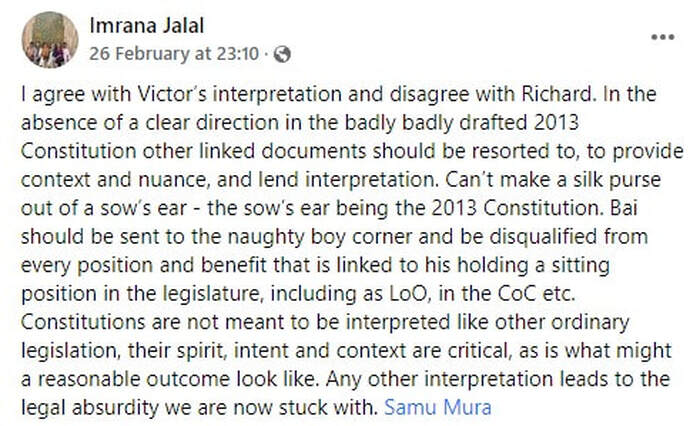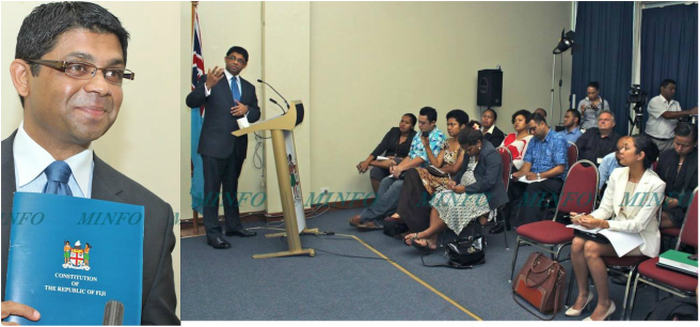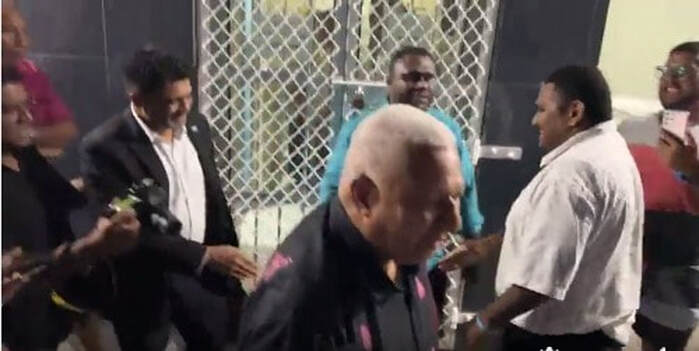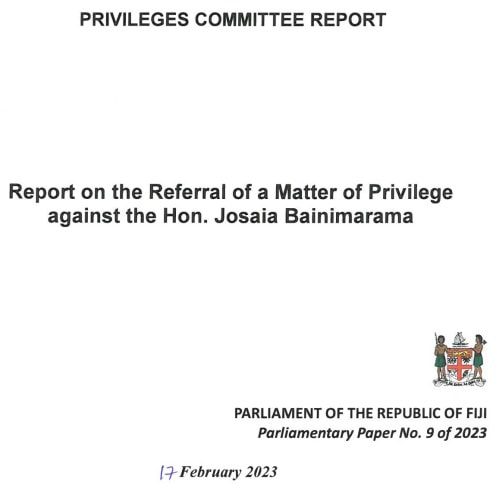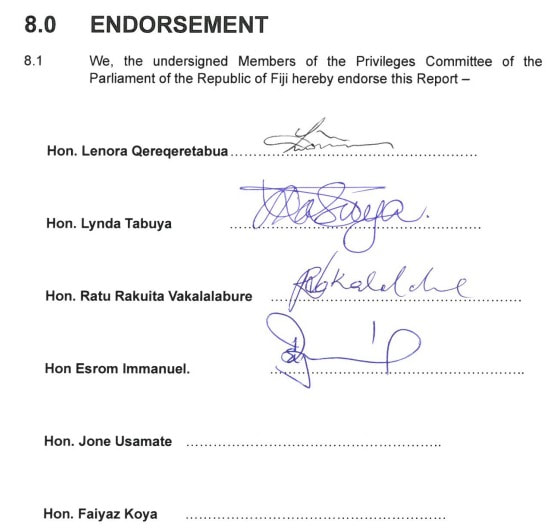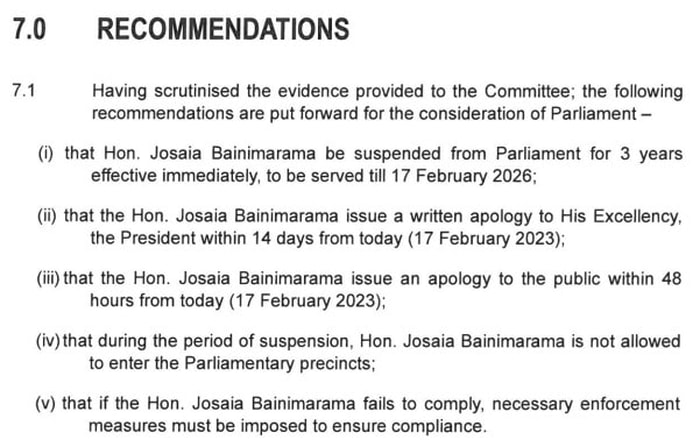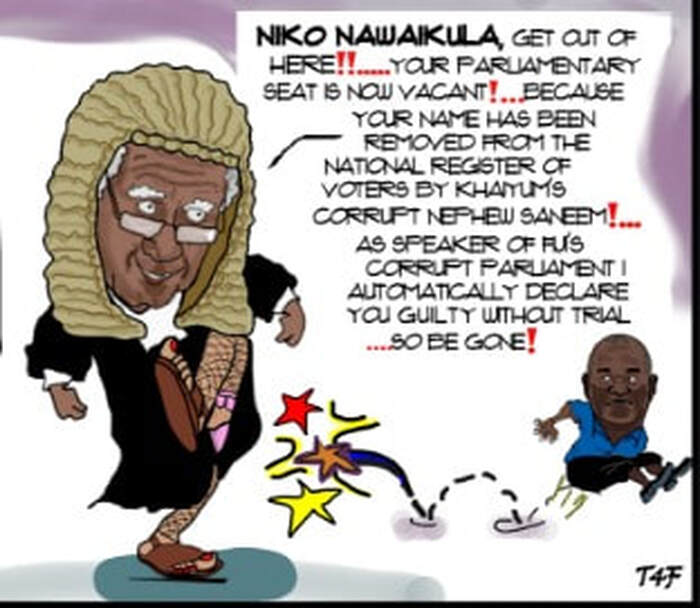They endorse our Founding Editor-in-Chief's Opinion in the Fiji Times,
25 February 2023:
‘Bainimarama cannot remain a member of the Constitutional Offices Commission under Section 78 of the 2013 Constitution of Fiji.’
According to Suva lawyer Richard Naidu (‘Bainimarama remains as Leader of the Opposition, February 19, The Fiji Times), the FFP MP Frank Bainimarama, despite his suspension from Parliament for breach of privilege, not only remains the Opposition Leader but, among other constitutional roles, retains his membership in the Constitutional Offices Commission (COC).
Mr Naidu was relying on Section 78 of the 2013 Constitution of Fiji. We, however, beg to differ with Mr Naidu’s interpretation regarding Mr Bainimarama’s membership of the COC. Let us examine the Standing Orders of the Parliament of Fiji (Standing Order 15(3)(1) that was amended by the FFP government and gazetted on February 20, 2017.
What rights do a Parliament member forfeits on suspension by the Privileges Committee?
A member who is suspended from the service of Parliament under Standing Order 76 or 77 must not do any of the following: a) enter the Chamber; b) vote; c) serve on a committee; d) lodge a question or notice of motion.
Despite Mr Naidu’s view, we would like to argue that Mr Bainimarama cannot serve on the COC. Although it is not technically a committee, for there are standing, select, and special committees, the COC is an extended committee of Parliament.
The word “commission” is absent from the Standing Orders of the Parliament of Fiji. Standing Order 127 provides for the establishment of a Privileges Committee.
This committee comprises the following members:
1. the Deputy Speaker, the Chairperson of the Committee; and
2. five members appointed by the Speaker in consultation with the Prime Minister and the Leader of the Opposition.
The mandate of the Committee is to: a) bring to the attention of Parliament any breach of privileges of Parliament committed by any person; b) consider any question of privilege which may be referred to it by Parliament or by the Speaker; c) inquire into any complaint that may be referred to it by Parliament or the Speaker regarding any breach of privilege by any person; and d) provide reports and recommendations to Parliament as a result of such referral.
Last week, the Privileges Committee advised Parliament on Mr Bainimarama’s suspension and penalties.
The Parliament, the supreme authority to make laws, voted to suspend Mr Bainimarama. The COC, by extension, is linked to the legislature.
While expressing his views on Bainimarama’s suspension, Mr Naidu conceded that there might “be a legal argument” to his interpretation of Section 78 of the Constitution. On Mr Bainimarama’s continued membership of the COC, we argue that on suspension, he forfeited the right to COC membership. Mr Bainimarama must resign from COC.
If he refuses, the Privileges Committee will reconvene and remove him from the COC. The drafters of the 2013 Constitution had not envisaged a situation whereby the Leader of the Opposition had to be suspended from Parliament for breach of privilege.
In this case, Mr Bainimarama. He was meant to rule for eternity.
And any non-FFP MP found guilty by the Privileges Committee – Ratu Naiqama Lalabalavu, Tupou Draunidalo, and Ratu Isoa Tikoca – were given the boot out of Parliament.
We argue that Mr Bainimarama is booted out of the Constitutional Offices Commission.
It is unacceptable that while he is barred from partaking in constitutional matters inside Parliament, he is free to sit outside Parliament on the COC and deliberate on issues of national and constitutional importance to Fiji. Otherwise, what is the point of suspending him from Parliament?
The Standing Orders disqualify him from serving on any committee or commission after the Privileges Committee suspended his primary membership of Parliament. Out must mean Out. Tuba. Tuba.
According to Suva lawyer Richard Naidu (‘Bainimarama remains as Leader of the Opposition, February 19, The Fiji Times), the FFP MP Frank Bainimarama, despite his suspension from Parliament for breach of privilege, not only remains the Opposition Leader but, among other constitutional roles, retains his membership in the Constitutional Offices Commission (COC).
Mr Naidu was relying on Section 78 of the 2013 Constitution of Fiji. We, however, beg to differ with Mr Naidu’s interpretation regarding Mr Bainimarama’s membership of the COC. Let us examine the Standing Orders of the Parliament of Fiji (Standing Order 15(3)(1) that was amended by the FFP government and gazetted on February 20, 2017.
What rights do a Parliament member forfeits on suspension by the Privileges Committee?
A member who is suspended from the service of Parliament under Standing Order 76 or 77 must not do any of the following: a) enter the Chamber; b) vote; c) serve on a committee; d) lodge a question or notice of motion.
Despite Mr Naidu’s view, we would like to argue that Mr Bainimarama cannot serve on the COC. Although it is not technically a committee, for there are standing, select, and special committees, the COC is an extended committee of Parliament.
The word “commission” is absent from the Standing Orders of the Parliament of Fiji. Standing Order 127 provides for the establishment of a Privileges Committee.
This committee comprises the following members:
1. the Deputy Speaker, the Chairperson of the Committee; and
2. five members appointed by the Speaker in consultation with the Prime Minister and the Leader of the Opposition.
The mandate of the Committee is to: a) bring to the attention of Parliament any breach of privileges of Parliament committed by any person; b) consider any question of privilege which may be referred to it by Parliament or by the Speaker; c) inquire into any complaint that may be referred to it by Parliament or the Speaker regarding any breach of privilege by any person; and d) provide reports and recommendations to Parliament as a result of such referral.
Last week, the Privileges Committee advised Parliament on Mr Bainimarama’s suspension and penalties.
The Parliament, the supreme authority to make laws, voted to suspend Mr Bainimarama. The COC, by extension, is linked to the legislature.
While expressing his views on Bainimarama’s suspension, Mr Naidu conceded that there might “be a legal argument” to his interpretation of Section 78 of the Constitution. On Mr Bainimarama’s continued membership of the COC, we argue that on suspension, he forfeited the right to COC membership. Mr Bainimarama must resign from COC.
If he refuses, the Privileges Committee will reconvene and remove him from the COC. The drafters of the 2013 Constitution had not envisaged a situation whereby the Leader of the Opposition had to be suspended from Parliament for breach of privilege.
In this case, Mr Bainimarama. He was meant to rule for eternity.
And any non-FFP MP found guilty by the Privileges Committee – Ratu Naiqama Lalabalavu, Tupou Draunidalo, and Ratu Isoa Tikoca – were given the boot out of Parliament.
We argue that Mr Bainimarama is booted out of the Constitutional Offices Commission.
It is unacceptable that while he is barred from partaking in constitutional matters inside Parliament, he is free to sit outside Parliament on the COC and deliberate on issues of national and constitutional importance to Fiji. Otherwise, what is the point of suspending him from Parliament?
The Standing Orders disqualify him from serving on any committee or commission after the Privileges Committee suspended his primary membership of Parliament. Out must mean Out. Tuba. Tuba.
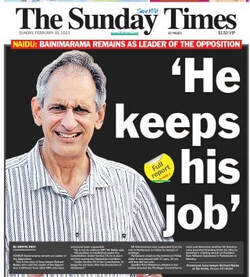
FijiFirst leader Voreqe Bainimarama remains as Leader of the Opposition despite his suspension from Parliament on Friday for breach of privilege, according to Fiji constitutional lawyer Richard Naidu.
Naidu told the Sunday Times he believed that Bainimarama was entitled to retain the salary and other rights that go with the job — although “there might be a legal argument” about that.
He said that the Leader of the Opposition was different from other MPs who had previously been suspended.
He is not an ordinary MP. His position is established under the Constitution. Under Section 78, he is elected from among the Opposition members,” he said.
“Under Section 78 of the Constitution, he keeps his job even after the dissolution of Parliament.”
Naidu said the Opposition Leader had other constitutional roles outside Parliament, including being a member of the Constitutional Offices Commission (COC).
“He is also one of the people who may nominate a new President for Parliament to vote on under Section 84.
‘Must not be varied’
“It seems that he can continue to do these jobs — and to keep his salary, which Section 80 of the Constitution says “must not be varied to his disadvantage”.
“Other suspended MPs have had their salary payments suspended while out of Parliament.
“So there might be a legal argument about that.
“But other suspended MPs did not hold a substantive office as Mr Bainimarama does.”
Naidu said that despite the suspension, Bainimarama remained an MP — however, he could not attend Parliament for three years.
“While he is suspended, he is not replaced in Parliament. This means the voting strength of the FijiFirst Party drops to 25 while he is suspended.
“It is for the Opposition MPs to work out how they will operate in Parliament while Bainimarama isn’t there. But while he continues to hold the post, a new Leader of the Opposition cannot be appointed.
Could be voted out
“Under the Constitution, if a majority of Opposition members want Bainimarama out, they could vote him out.
“He could resign as Leader of the Opposition only and keep his seat as an MP. Or he could resign both as Leader of the Opposition and as an MP.
“If he resigned as an MP, a new FijiFirst Parliamentarian would come in; the next one on the list of candidates who missed out in the 2022 election.”
Naidu told the Sunday Times he believed that Bainimarama was entitled to retain the salary and other rights that go with the job — although “there might be a legal argument” about that.
He said that the Leader of the Opposition was different from other MPs who had previously been suspended.
He is not an ordinary MP. His position is established under the Constitution. Under Section 78, he is elected from among the Opposition members,” he said.
“Under Section 78 of the Constitution, he keeps his job even after the dissolution of Parliament.”
Naidu said the Opposition Leader had other constitutional roles outside Parliament, including being a member of the Constitutional Offices Commission (COC).
“He is also one of the people who may nominate a new President for Parliament to vote on under Section 84.
‘Must not be varied’
“It seems that he can continue to do these jobs — and to keep his salary, which Section 80 of the Constitution says “must not be varied to his disadvantage”.
“Other suspended MPs have had their salary payments suspended while out of Parliament.
“So there might be a legal argument about that.
“But other suspended MPs did not hold a substantive office as Mr Bainimarama does.”
Naidu said that despite the suspension, Bainimarama remained an MP — however, he could not attend Parliament for three years.
“While he is suspended, he is not replaced in Parliament. This means the voting strength of the FijiFirst Party drops to 25 while he is suspended.
“It is for the Opposition MPs to work out how they will operate in Parliament while Bainimarama isn’t there. But while he continues to hold the post, a new Leader of the Opposition cannot be appointed.
Could be voted out
“Under the Constitution, if a majority of Opposition members want Bainimarama out, they could vote him out.
“He could resign as Leader of the Opposition only and keep his seat as an MP. Or he could resign both as Leader of the Opposition and as an MP.
“If he resigned as an MP, a new FijiFirst Parliamentarian would come in; the next one on the list of candidates who missed out in the 2022 election.”





